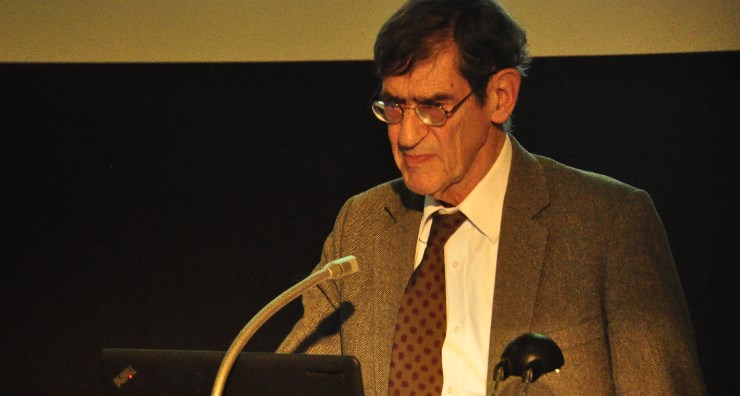Driving commercial and political engagement between Asia, the Middle East and Europe
Driving commercial and political engagement between Asia, the Middle East and Europe
Driving commercial and political engagement between Asia, the Middle East and Europe

The Chairman of Asia House Sir John Boyd was one of the panel speakers at the Oxford China Forum’s inaugural panel discussions held in November.
The Oxford China Forum was set up by Chinese students at Oxford University in January 2012 to explore and debate the central social, geopolitical and economic challenges facing China today.
The Forum held three panel discussions on November 16, 2013 at Magdalen College in collaboration with the new Dickson Poon China Centre Building.
The centre of expertise on China, named after Hong Kong philanthropist Dickson Poon, is set to open at the University of Oxford in March 2014 under the direction of Rana Mitter, Professor of the History and Politics of Modern China at Oxford University.
More than 170 people, primarily undergraduates across multiple disciplines, attended the three debates.
Sir John, who was a junior diplomat in the office of the British Chargé d’Affaires in Beijing from 1965 to 1967 and later First Secretary in the British Embassy from 1973 to 1975, sat on the International Relations Panel.
The other speakers were Senior Fellow at the European Centre for International Political Economy Guy de Jonquières; Postdoctoral Fellow at the University of Oxford and Convenor of the Oxford University China-Africa Network Dr Harry Verhoeven; Professor of International Relations at Oxford University Rosemary Foot; Shadow Minister for Universities Liam Byrne MP and Director of the European Studies Centre Professor Kalypso Nicolaïdis.
The question posed to their panel was “Is China Set to Lead the World in the 21st Century?”
Sir John thought the question could not be answered with a simple “Yes” or “No” – his preferred answer was “Maybe”.
Speaking after the event, Sir John said: “A number of responses to the question as put struck me as unduly negative. My own context is the huge contrast between the China I first experienced and the present situation, thanks in particular to the transformative contribution of Deng Xiaoping.
“In my personal view the outcome of the recent Third Plenum of the 18th Central Committee in mid-November was consistent with this drive. A number of speakers at the Forum (and significant press commentators) questioned what had come out of the Plenum.
“But I argued that a series of decision (on residency restrictions, family policy and the role envisaged for the market) were important signals of political direction particularly against the background of a long running debate on ‘forward or back’.”
Sir John put the negative critique of Chinese reforms down to “habit.”
“There is a certain intellectual insensibility when addressing China because there have been disappointments in the past,” he said.
“One argument one hears is that it is not in the nature of the Chinese Communist Party to embrace genuine reform and another is the sheer complexity of getting anything done in such a vast polity,” he added.
Sir John said he preferred a forward-looking analysis, resting on the propositions that China’s economic performance has been astonishing but ruling China is complicated.
“There is a huge back history; the country has still got much poverty to sort out; so it is not going to leap frog in short order to the front. Chinese reactions are invariably complex and an awful lot of political energy has gone on sorting out domestic problems. But China requires a settled position at the global top table to defend its national interests.
“The Chinese know well that there are vital problems in international trade, finance and the environment affecting China’s own welfare that can only be solved by the collective effort. Domestic pressures point the same way. China also has questions of her own to ponder from the Middle East and to Korea,” he added.
“China will have a say in the major decision s on the world economy and the arrangement of power in the world,” he concluded.
He alluded to the various difficulties inflicted on China in the 19th century. “They don’t want ever to be in that position again,” he said.
Two other panels were convened for the inaugural Oxford event. One asked: “Is this the end of the Chinese Economic Miracle?” The other asked: “Is the Chinese Communist Party Sustainable?”
Sir John, who was ambassador to Japan from 1992 to 1996, also sat through part of the latter panel.
He said the consensus there seemed to be that the Communist Party was not going to give up power or allow the emergence of multiple power centres. It was indeed slow to change. But on sustainability the jury was out. Part of the answer would lie in results.
Meanwhile, Sir John thought we should focus less on abstract futurology and more on concrete ways to deepen engagement with China.
Other speakers at the event included Jamil Anderlini, Financial Times Beijing Bureau Chief; Ben Chu, Economics Editor of The Independent; Will Hutton, author of The Writing on the Wall: China and the West in the Twenty-First Century; Victor Chu, chairman and CEO of First Eastern Investment Group; Sir Christopher Hum, former British Ambassador to China and Professor Rana Mitter.
Co-Founder of the Forum Aidan Davies said: “We believe that this was the first time at Oxford that China has been explored in such depth with such a diverse audience. We hope that Sir John’s involvement marks the beginning of a new era of China-related discussion and debate at the University.”
naomi.canton@asiahouse.co.uk
